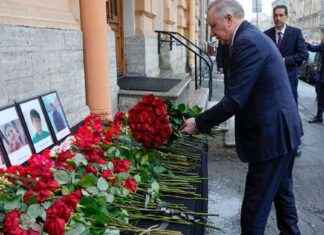When Javier Milei, the surprising winner of the presidential primaries and favorite in the first round this Sunday, talks about Argentine democracy that is turning 40 years old, several alarm signals go off.
“We have probably passed the desert of 40 years to regain freedom,” he declared on Wednesday at his campaign closing event. Was there no freedom during the longest democratic period in a century? Or was there freedom between 1976 and 1983, when the country was ruled by a military dictatorship? Or between 1973 and 1976, when the Peronist ultra-left and ultra-right began the bloodbath that multiplied during the dictatorship?
Milei does not answer those questions because in recent weeks he disappeared from the media that, fascinated by the audience levels he generated, elevated him in recent years and gave food to social networks that transformed him into a popular phenomenon. And he doesn’t respond, either, because in his interviews he sets prior limits: I’m not going to talk about this. And if not, there is no interview.
Will Milei sit down on December 10 in the main office of the Casa Rosada to lead a G-20 country? And if it happens, is Argentine democracy in danger?
That is going too far, although Jesús Rodríguez, former minister, former parliamentarian and today at the head of the General Auditor’s Office of the Nation, marks a deterioration. “The combination of populism and ideological necrophilia contributes to the understanding that people vote for anything,” Rodríguez explains to EL MUNDO. “There is a questioning of certain issues that we believed were internalized forever. Just as the international order that we knew is in doubt, the institutional infrastructure of the West is also being questioned.”
Rodríguez was a close collaborator of Raúl Alfonsín, the father of Argentine democracy, a social democratic leader of the Radical Civic Union (UCR), who governed between 1983 and 1989. He is very clear about the work that that president did, who failed with the economy, to inoculate the “virus” of democracy in Argentines, who had been resolving their political tensions with military coups for almost six decades.
This is no longer the case, and that is a merit that the entire Argentine political spectrum, which rarely agrees on anything, recognizes Alfonsín and radicalism, today integrated into the social-liberal coalition Together for Change (JxC). , which has Patricia Bullrich as its candidate. The entire political arc… except Milei, who confessed some time ago that, when she wants to relieve stress and release tensions, she beats to exhaustion a doll with Alfonsín’s face, which she defines as “the hyperinflationary failure.” .
What’s more, Milei insists that Argentine problems began in 1916 when Hipólito Yrigoyen, one of the historical leaders of the UCR, was elected president. She defines Yrigoyen as a “socialist.” What is striking is that that election marked the beginning of universal suffrage in Argentina, a true democratic achievement.
Rodríguez has no doubts: “Milei questions representative, liberal and republican democracy. That is in the antithesis of Milei’s thought. As was original Peronism.”
40 years ago, Alfonsín campaigned by reciting the preamble of the Argentine Constitution, defined at the time as a “secular prayer” that moved vast swaths of the middle class and allowed the radical leader an unprecedented victory with 52 percent over the Peronism. Today, Milei, a populist ultra-liberal, campaigned brandishing a chainsaw. Symbol of cutting public spending, yes, but an ominous image in a democracy.
Does that speak both about Milei and Argentine society? “There is no doubt,” says Rodríguez, who remembers that at the closing ceremony of Peronism in 1983 “a coffin that said Alfonsín was burned,” and he concludes: “For democracy to survive there must be democrats, and those sometimes do not exist.” abound.”
But political theory is one thing, and reality is another. Milei was received this Sunday like a rock star at his polling station. Among fans, journalists and curious onlookers, many of them carrying Venezuelan flags and shouting “long live freedom!”, it took him eternal minutes to reach his table.
When he finally did, he saluted and headed straight to the voting booth. The electoral authorities pointed out to her that she had to show her ID. The candidate backed down. Milei, with very strong ties to Vox, received support in person this weekend from Eduardo Bolsonaro, son of former Brazilian president Jair Bolsonaro.
Sergio Massa, the Peronist candidate, voted almost at the same time as Milei. He did it together with his family and spoke about the democratic vocation of Argentines, with a level of participation that seemed high.
Bullrich voted shortly after, also surrounded by media, voters and curious people. “Strength, Patricia, strength!” they shouted at her.
Although the polls are extremely discredited in Argentina, the majority of polls in recent weeks have indicated an advantage for Milei, who would be assured of his presence in the second round on November 19. Bullrich, who was second in the primaries behind Milei, disputes with Massa the other place in the runoff, which former president Mauricio Macri sees as a fact.
“There is going to be a ballot,” said the man who governed between 2015 and 2019, leader of a JxC that until a few months ago felt the election had been won and who today knows that Milei is the favorite, although it is not written that December 10 will be He who settles in the Casa Rosada.






